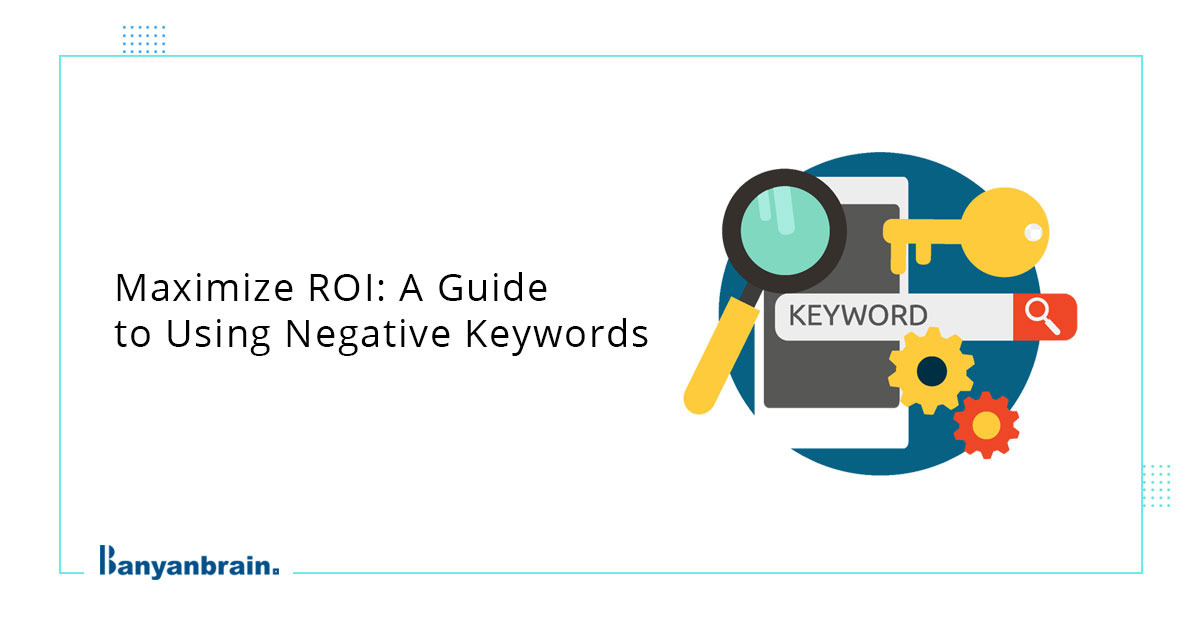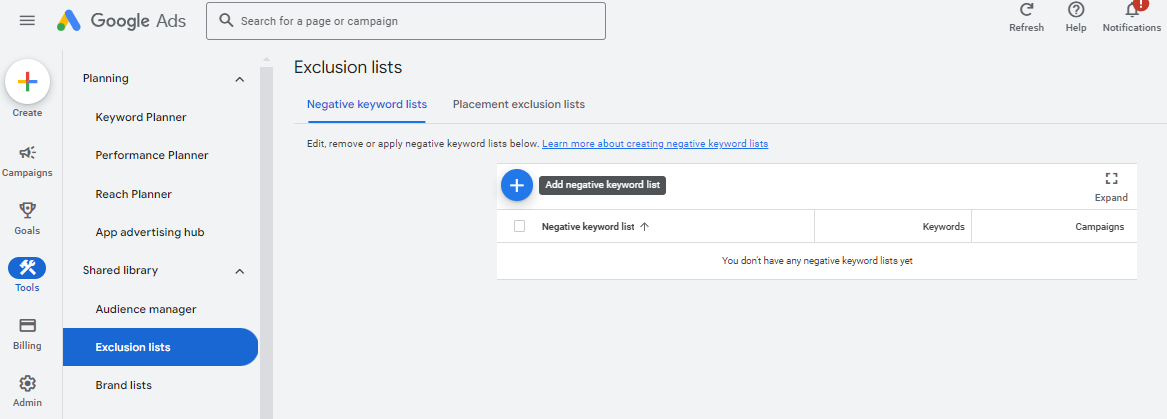Negative keywords in Google ads are words or phrases related to a topic added to pay-per-click campaigns to prevent your content from being shown in irrelevant searches. These keywords ensure that your advertisement is most visible to the people interested in the goods and services. For that, you need to analyze the keywords boosting your relevant search and those boosting your irrelevant searches. These keywords help you improve the efficiency of your content and reduce your spend on the campaigns.
This Google ads negative keywords guide will help you understand negative keywords in Google ads, how they can improve the reliability of paid search campaigns, and how to find them.
What are negative keywords in Google Ads?
Negative keywords in Google ads are keywords that are added to the Google ads campaign so that your advertisement is not shown to the person who is searching for a particular phrase that is irrelevant to your ad. An efficient paid campaign focuses on the relevant keywords initially and then distorts some of the search queries completely.
In Google ads, the main motive of negative keywords is to make your paid ads reach potential customers. Generally, advertisers choose keywords that they do not have to target. When you find negative keywords, search for terms that are like your keywords but might appear in search results of people searching for another product or service.
Display ads or videos prevent targeting irrelevant sites and videos; negative keywords in Google ads work slightly differently for ads or videos. For them, a range of 5,000 keywords are considered. Site category options and content exclusions can help you avoid targeting irrelevant sites or content.
Examples of negative keywords in different industries:
- In e-commerce, let there be a clothing brand where your target audience is customers who are willing to buy branded, expensive products. You want to run Google ads but want to avoid irrelevant clicks. You are running ads with the keyword “branded clothes,” but you noticed that ads are getting clicked for cheap clothes and baggy clothes, and these keywords are not improving the sales. Therefore, you can use baggy and cheap as negative keywords to avoid clicks from those searches.
- In the service sector, suppose there is a marketing agency using advertising agency as the keyword, but again, it appears in results for free tools, how-to…, or marketing internships. Then, you can use these keywords as negative ones to avoid appearing in results for these searches.
- In the B2B sector, if a business consultant company uses business consultancy as its keyword but your company appears in results for individual business programs but provides consultancy to bigger businesses, you can use individual business as effective negative keywords for Google ads.
Why are negative keywords important in PPC?
Negative keywords are crucial for PPC ads for various reasons that need to be highlighted because they are often neglected. Let’s explore the importance of negative keywords in Google ads:
- Cost-efficient: Using Google negative keywords is cost-efficient as it will limit the clicks to potential customers interested in your products and services. You will also not be paying for irrelevant clicks. Thus, you will be able to spend your budget effectively.
- Enhance the conversion rate: Inculcating negative keywords in the ads will increase the conversion rate, as only interested audiences or customers with more chances of converting into paying customers would be targeted. Better ad placement will also improve sales and conversion.
- Securing brand identity: Using negative keywords in Google ads will help you protect your brand identity by not linking your product or service with keywords like cheap, free, or irrelevant to your ads.
- Enhance your quality: Negative keywords make your content more relevant to the landing pages. This enhances your quality score, which is the metric that impacts the location of your ads.
- Improve ROAS: Return On Ad Spend is the money spent on the PPC ad. Negative keywords in Google ads help improve ROAS as there are more conversions and CTRs (Click-Through Rates).
What are the types of negative keywords?
Negative keywords can be inculcated in the ad campaign as broad, phrase, or exact match types based on what suits the most. It is essential to know what each type includes to understand their work and value in maintaining ads’ quality. So, now we will discuss different types of negative keywords in Google ads:
Broad match: Broad match negative keywords help to protect your ad from coming in search results that consist of every broad match negative keyword in any order, yet your ad can be visible for some words in the phrase. For example, if duplicate footwear is your negative broad match, then your ad would not appear for searches such as cheap duplicate footwear, footwear duplicate, duplicate footwear cheap.
Phrase match: Phrase match negative keywords prevent your ad from showing if those exact terms have been searched for in the same order. It can consist of additional words before or after the phrase. For example, if your negative phrase search keyword is branded portable bags, your ad would not be shown for searches such as cheap branded portable bags or branded duplicate portable bags.
Exact match: Exact match negative keywords prevent your ad from appearing in search results for a search that consists of ads containing the phrase as it is with no extra words after or before. The ad will be visible if the users have searched for keywords using external words.
These three are the different types of negative keywords in Google ads that can help you appear in the most relevant searches. You must use them properly to avoid hindering your relevant searches.
Important points to remember:
- If you want to discard broad search terms irrelevant to your ads, you can use broad match negative keywords in Google ads. However, they can be restrictive sometimes, so be careful while deciding on them so that they will not exclude your relevant searches. Mostly, use this when dealing with a large volume of irrelevant traffic.
- If you want to discard some particular phrases and permit variation in the search queries, phrase match negative keywords would be the best option to provide balanced control over search queries. This middle-ground option would be best if you want to restrict some searches and allow variations.
- Exact match negative keywords will be the best option if you want to eliminate the particular search terms, and with it, it will let your ad appear to teh similar search. It is the most restrictive that allows you to restrict particular search terms precisely with no impact on the related terms.
How to find negative keywords for Google Ads?
Negative keywords can be recognized in different ways. If you want your ad not to appear in irrelevant searches, then it is a must to identify negative keywords in Google ads. Let’s discuss these three ways through which you can find the negative keywords in Google ads:
Keyword research: Negative Keyword research is very important at every stage of ad development. They help you to understand how users search for your niche. So, research effective negative keywords in Google ads using keyword tools, then analyze the most used; in parallel, you will get to know the words irrelevant to your site.
For example, if your company appears in search when people use keywords like gym clothes, keywords like cheap clothes and casual clothes would be negative keywords for your business.
Using the search terms report in Google Ads: You can also find the negative keywords by using the search term report in Google Ads. This can be done by going to the keywords tab and clicking on search terms. This will give you a brief list of keywords that have triggered your ads as search results. Third, you can check and remove irrelevant keywords and add them to the negative keywords lists.
Analyzing competitor keywords: Analyse the competitor’s voice and look for the keywords they are aiming at but are not suitable for your business. Add them to the negative keywords to prevent aiming at the same audience segment. This mostly happens when you are aiming for broad industry terms. You can use tools like SEMrush or Ahrefs to analyze which keywords competitors are ranking for.
How do you use negative keywords in Google Ads?
Negative keywords can be used in different ways in Google ads. Google ads accounts are categorized into three levels: account, campaigns, and ad group. Account-level negative keywords are applicable to all the campaigns in your account; campaign-level negative keywords apply to all the ads in the campaigns; ad group-level keywords are applicable to particular ad groups in the campaign. Now, let’s discuss the ways how you can add negative keywords in Google ads:
- First, go to the Google Ad account and click on the Tools icon.
- In the section menu, click on the Shared Library dropdown.
- After that, click on the Exclusion list and go to the Negative keyword list.
- In the negative keywords option; click on the plus icon.
- Give the List name and Add the negative keywords that you want to apply.
- Then, choose the campaigns where you want to apply those keywords.
- Then click save. Here, negative keywords are added to your campaign.
Refer to the image below, which shows the path to add a negative keyword list:
What are the common mistakes to avoid?
Some common mistakes to avoid while running ad campaigns to maintain effectiveness; let’s discuss these common mistakes in using negative keywords in your Google ads:
- Overuse of negative keywords: Including a lot of broad-match keywords in your content will decrease the visibility of your ad or even block traffic. Therefore, I prefer using exact match and phrase-match keywords to avoid distracting relevant traffic. So, add the keywords carefully.
- Less use of negative keywords: Not using negative keywords in your ad can lead to wasted spending and attract irrelevant clicks, which can cause poor ad performance.
- Not updating the negative keywords: Keyword addition is an ongoing process; adding keywords and not updating them according to trends and search queries will reduce your visibility and cause you to miss opportunities for relevant traffic.
- Using the wrong match type: Using the correct keyword match type is very important for your campaigns, as every ad has its requirements. If you use the wrong match type, there is a chance of significantly less traffic to your website.
Advanced Tips for Using Negative Keywords
Let’s discuss some of the tips for using negative keywords in your Google ads:
- Creating a shared negative keyword list: Negative keyword lists must be used as they can potentially improve your PPC performance. They will help you differentiate your brand from non-brand terms and competitor negatives.
- Using negative keywords to refine audience targeting: Negative keywords must be used efficiently so that they will refine your audience. For this, the selection of keywords must be precise, and the placement of the type must be accurate.
- Avoid competing with your ads: In dynamic search ads, when two ads are running simultaneously, it would be better to use the active keyword of your one ad to another negative keyword. Add negative keywords to maximize your performance.
- Combining negative keywords with other targeting methods (e.g., location, demographics): You can also use negative keywords and consider factors such as demographics, location, or language. You can target a specific language, location, or demographics to avoid the entry of irrelevant traffic from users who are not interested.
Negative keywords in Google ads are beneficial if used efficiently; they can help your ads reach the target audience and avoid irrelevant traffic. Different types of negative keywords can be employed in your ads for Google ads optimization. This can be done through the Google ads account itself.
You must consider the best practices to inculcate negative keywords in your Google ads, update them as per the latest trends, and don’t overuse or underuse them to get the best results out of your investment.
Banyanbrain, one of the most reliable online marketing companies, can provide you with the best PPC services for your ads, which will help generate potential traffic to your website.
FAQs
How do you decide on negative keywords?
First, you must evaluate your search terms report, conduct comprehensive keyword research, recognize the keywords that will trigger irrelevant traffic, and analyze your goals and competitors’ perspectives to decide on negative keywords.
What is the power of negative keywords?
The power of negative keywords in Google ads is their capability to refine traffic and make it suitable for your ads, decrease wasted spending, and enhance campaign targeting, causing high ROAS.
What is a negative keyword example?
If there are clothing brands whose running keyword is branded clothes, but keywords like cheap clothes and branded copied clothes are also generating traffic to their ads, these terms can be used as negative keywords to avoid generating irrelevant traffic to their ads.
How can we choose the right keyword?
You can choose the best negative keyword by understanding your audience, analyzing competitors, reviewing keywords your competitors are targeting, checking search volume and competition, focusing on Intent, testing, and refining.
How do I remove negative keywords?
You can remove negative keywords only through your Google account. First, log in, select a campaign or ad group, and go to negative Keywords for Specific lists. Find the negative keyword you want to remove, check the box next to it, click the trash icon, and then save the changes.
What’s the benefit of negative keywords?
Negative keywords are very beneficial as they help refine targeting, improve quality scores, create relevant ads that convert better, and save money on CPCs.
How do you generate a negative keyword list?
You can create a keyword list by following the steps:
- Conduct Keyword Research
- Analyze Search Terms Report
- Review Competitor Keywords
- Identify Common Irrelevant Terms
- Create a List
- Implement and Test
Where should you add negative keywords if you want?
You can add negative keywords in your Google ads at different levels:
- Campaign level
- Account level
- Ad group level







